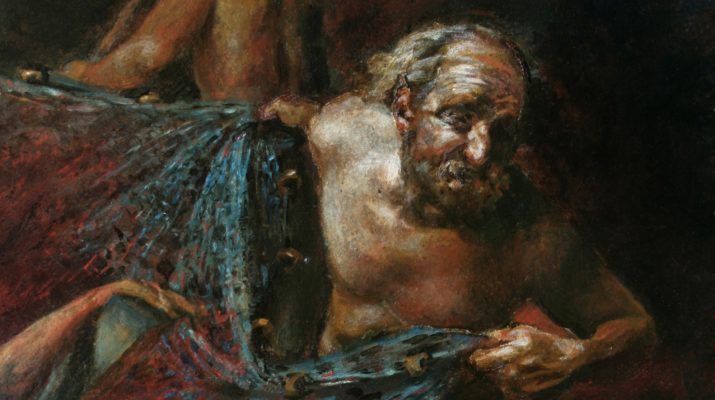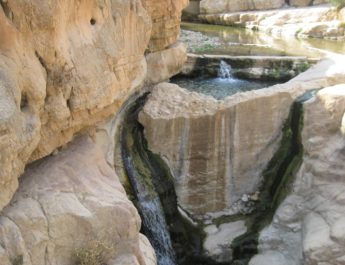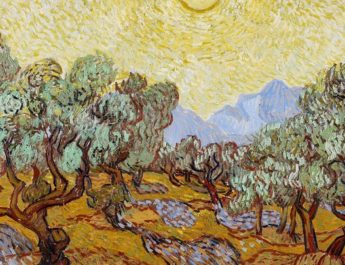Matthew 16:21-28
Proper 17A
21 From that time on, JesusA, B beganC
A “Jesus” = Iesous. From Hebrew Yehoshua (Joshua, the Lord is salvation); {from YHVH (proper name of the God of Israel; the self-existent and eternal one); {from havah (to become) or from hayah (to come to pass, become, be)} + yasha (to deliver, defend, help, preserve, rescue; properly, to be open, wide or free, which implies being safe. So, in a causative sense, this is to free someone)}. This is Jesus or Joshua in Greek – the Lord saves or the Lord is salvation.
B {untranslated} = Christos. From chrio (consecrate by anointing with oil; often done for prophets, priests, or kings). Literally, the anointed one, Christ. The Greek word for Messiah.
C “began” = archomai. From archo (to rule, begin, have first rank or have political power). This is to begin or rule.
to showD his disciplesE that he mustF goG
D “show” = deiknumi. This is to show in a literal or figurative sense so it can be to teach, bring, or point out.
E “disciples” = mathetes. From matheteuo (to make a disciple of); from manthano (to learn key facts, gain knowledge from experience; generally implies reflection as part of the learning process); from math– (thinking things through). This is a disciple, learner, or student. It is where we get “mathematics” from.
F “must” = dei. From deo (to tie, bind, compel; declare unlawful). This is what is necessary or proper. It is what is needed or what one should do – a duty or something inevitable. This refers to something absolutely necessary.
G “go” = aperchomai. From apo (from, away from) + erchomai (to come or go). This is to depart, follow, or go off in a literal or figurative sense.
to JerusalemH and undergo greatI sufferingJ at the hands of the eldersK and chief priestsL
H “Jerusalem” = Hierosoluma. From Hebrew Yerushalaim (probably foundation of peace); {from yarah (to throw, shoot, be stunned; to flow as water so figuratively to instruct or teach) + shalam (to make amends, to be complete or sound)}. This is Jerusalem, dwelling of peace.
I “great” = polus. This is much, often, plenteous – a large number or a great extent.
J “undergo…suffering” = pascho. Akin to penthos (mourning, sorrow). This is to be acted on for good or ill. It is often used for negative treatment. Properly, it means feeling strong emotions – especially suffering. It can also be the ability to feel suffering.
K “elders” = presbuteros. From presbus (old man). This is an elder as one of the Sanhedrin and also in the Christian assembly in the early church.
L “chief priests” = archiereus. Related to “began” in v21. From archo (see note C above) + hiereus (a priest literal or figurative – of any faith); {from hieros (sacred, something sacred, temple, holy, set apart; something consecrated to God or a god)} This is a high or chief priest.
and scribesM and be killedN and on the thirdO dayP be raised.Q
M “scribes” = grammateus. From gramma (what is drawn or written so a letter of the alphabet, correspondence, literature, learning); from grapho (to write). This is a writer, scribe, or secretary. Within Judaism, it was someone learned in the Law, a teacher. Also used in the Bible of the town-clerk of Ephesus. See Sirach 38:24-39:11 for a lengthier, positive passage about who scribes were and what they meant in society.
N “be killed” = apokteino. From apo (from, away from) + kteino (to kill). To put to death, kill, slay. Figuratively, this word can mean abolish, destroy, or extinguish.
O “third” = tritos. From treis (three). This is third.
P “day” = hemera. Perhaps from hemai (to sit). This is day, time, or daybreak.
Q “be raised” = egeiro. This is to awake, raise up or lift up. It can be to get up from sitting or lying down, to get up from sleeping, to rise from a disease or from death. Figuratively, it can be rising from inactivity or from ruins.
22 And PeterR took him asideS and began to rebukeT him,
R “Peter” = Petros. Related to petra (large rock that is connected and or projecting like a rock, ledge, or cliff; can also be cave or stony ground). This is Peter, a stone, pebble, or boulder.
S “took…aside” = proslambano. 12x in NT. From pros (at, to, toward, with) + lambano (active acceptance/taking of what is available or what has been offered; emphasizes the choice and action of the individual). This is to take aside, accept, receive, or welcome. It can be to take in a friendly or hospitable sense or to eat (i.e. take food).
T “rebuke” = epitimao. From epi (on, upon, against, what is fitting) + timao (properly, this is setting a value or price on something, to estimate. Figuratively, it speaks to what level of honor we afford someone or something depending on our personal feeling toward it. By implication, this can mean to revere or honor); {from time (worth or perceived value; literally, price, but figuratively, the honor or value one sees in someone or something; can be esteem or dignity; can also mean precious or valuables); from tino (to pay, be punished, pay a penalty or fine because of a crime); from tio (to pay respect, value)}. This is to render what is due – to assign the value that is appropriate for the situation. So, it could mean to honor or to warn, to rebuke or to charge. Generally, it is a warning meant to guide someone away from doing something wrong or taking the wrong path. It can imply to forbid.
saying,U “God forbidV it, Lord!W This must never happenX to you.”
U “saying” = lego. This is to speak, say, name, call, command. It is generally to convey verbally.
V “God forbid” = hileos. Literally, “God be gracious to you.” 2x in NT. From hilaos (gracious, benevolent) or from haireomai (to take, choose, or prefer); {probably related to airo (raise, take up, lift, remove)}. This is forgiving or merciful. It was used more broadly to describe appeasing the wrath of the gods. As merciful, it can be cheerful, attractive. Also, God forbid in the sense of a misfortune to be avoided.
W “Lord” = Kurios. From kuros (authority, supremacy). This is a respectful address meaning master or sir. It refers to one who has control or power greater than one’s own. So, it was also applied to God and Jesus as Master or Lord.
X “happen” = eimi. This is to be, exist.
23 But he turnedY and said to Peter, “GetZ behindAA me, Satan!BB
Y “turned” = strepho. From trope (turning, shifting, a revolution; figuratively, a variation); from trepo (to turn). This is to turn, change, turn back, be converted; to turn around completely to take the opposite path or a completely different one.
Z “get” = hupago. From hupo (by, under, under the authority of) + ago (lead, bring, guide, spend, drive, carry). This is to lead under so to depart, go away, or die. It is to lead away under the command of someone else, being given a mission or objective to carry out.
AA “behind” = opiso. From the same as opisthen (after, back, from the rear); probably from opis (back); from optanomai (to appear, be seen); perhaps from horao (become, seem, appear). This is back, behind, after.
BB “Satan” = Satanas. From Hebrew satan (adversary, Satan); from satan (to be an adversary, attack, accuse, resist). This is Satan, the adversary, or an adversary.
You areCC a hindranceDD to me, for you are setting your mindEE not on divineFF things but on humanGG things.”
CC “are” = eimi. Same as “happen” in v22. See note X above.
DD “hindrance” = skandalon. 15x in NT. Perhaps from kampto (to bend or bow). This is a stumbling block, offense, hindrance, or scandal. Properly, this is the part of the trap that triggers it shut on the victim. So, as a snare, it is anything that causes error or offense, something that makes one stumble or traps someone. This is where the word “scandal” comes from.
EE “setting…mind” = phroneo. From phren (diaphragm, heart, intellect, understanding; figurative for personal opinion or inner mindset; thought regulating action; sympathy, feelings, cognition); perhaps from phrao (to rein in or curb). This is to think, judge, use one’s mind, have an opinion, shape one’s opinion through action.
FF “divine” = theos. From Proto-Indo-European origins, meaning do, put, place. This is God or a god in general.
GG “human” = anthropos. Related to “behind” in v23. Probably from aner (man, male, husband) + ops (eye, face); {from optanomai (see note AA above)}. This is human, humankind. Used for all genders.
24 Then Jesus told his disciples, “If any wishHH to comeII afterJJ me,
HH “wish” = thelo. This is to wish, desire, will, or intend. It is to choose or prefer in a literal or figurative sense. It can also mean inclined toward or take delight in. It can have a sense of being ready to act on the impulse in question.
II “come” = erchomai. Related to “go” in v21. See note G above.
JJ “after” = opiso. Same as “behind” in v23. See note AA above.
let them denyKK themselves and take upLL their crossMM and followNN me.
KK “deny” = aparneomai. 11x in NT– 8x of Peter’s denial of Jesus, 2x “let them deny themselves and take up their cross and follow me” (Mt 16:24 & Mk 8:34), 1x “whoever denies me before others will be denied before the angels of God” (Lk 12:9). From apo (from, away from) + arneomai (to deny, disown, refuse, repudiate someone or a previously held belief, to contradict); {from a (not) + rheo (say, speak of)}. This is a strong denial or rejection – utter denial, disowning, or repudiation.
LL “take up” = airo. Related to “God forbid” in v22. See note V above.
MM “cross” = stauros. From the same as histemi (to stand, cause to stand). This is an upright stake, cross. Literally refers to the horizontal beam of a Roman cross, generally carried by the one convicted to die.
NN “follow” = akoloutheo. From a (with, fellowship, union) + keleuthos (road, way). This is to accompany or follow someone, especially the way a disciple does.
25 For those who wantOO to savePP their lifeQQ
OO “want” = thelo. Same as “wish” in v24. See note HH above.
PP “save” = sozo. From sos (safe, rescued, well). This is to save, heal, preserve, or rescue. Properly, this is taking someone from danger to safety. It can be delivering or protecting literally or figuratively. This is the root that “savior” and “salvation” come from in Greek.
QQ “life” = psuche. From psucho (to breathe, blow). This is breath, the breath of life, the self, individual, soul. This is the word for that which makes a person unique – their identity, will, personality, affections. This isn’t the soul as the immortal part of us, but as our individuality. It is also not life as a general concept, but specific to people. This is where the words psyche and psychology come from.
will loseRR it, and those who lose their life for my sake will findSS it. 26 For what will it profitTT themUU
RR “lose” = apollumi. From apo (from, away from) + ollumi (to destroy or ruin; the loss that comes from a major ruination). This is to destroy, cut off, to perish – perhaps violently. It can also mean to cancel or remove.
SS “find” = heurisko. This is to find, learn, or obtain. It is to discover something, which generally implies a period of searching for it. This is to find in a literal or figurative sense. This is where the word “heuristic” comes from.
TT “profit” = opheleo. 15x in NT. From ophelos (help, gain, profit); from ophello (to heap up or increase). This is to help, benefit, do good, or be useful.
UU “them” = anthropos. Same as “human” in v23. See note GG above.
if they gainVV the wholeWW worldXX but forfeitYY their life?
VV “gain” = kerdaino. 17x in NT. From kerdos (profit, gain, advantage). This is to gain, win, or acquire. It is a word from the sphere of bartering and trading. Figuratively, it can mean trading up.
WW “whole” = holos. This is whole, complete, or entire. It is a state where every member is present and functioning in concert. This is the root of the word “whole.”
XX “world” = kosmos. Perhaps from the base of komizo (to carry, convey, recover); from komeo (to take care of). This is order, the world, the universe, including its inhabitants. Literally, this is something that is ordered so it can refer to all creation. It can also refer to decoration in the sense that something is better ordered and, thus, made more beautiful. This is where “cosmos” and “cosmetics” come from.
YY “forfeit” = zemioo. 6x in NT. From zemia (damage, loss, failed deal; business matter ending in fine or penalty or loss); probably related to damazo (to tame or subdue). This is to damage, cause a loss, punish, forfeit, be damaged or cast away.
Or what will theyZZ giveAAA in return forBBB their life?
ZZ “they” = anthropos. Same as “human” in v23. See note GG above.
AAA “give” = didomi. To give, offer, place, bestow, deliver. This is give in a literal or figurative sense.
BBB “in return for” = antallagma. 2x in NT. From anti (opposite, instead of, against) + allasso (to change, transform) {from allos (other, another; another of a similar kind or type)}. This is to exchange, an equivalent, a ransom.
27 “For the SonCCC of ManDDD is toEEE come
CCC “Son” = huios. This is son, descendant – a son whether natural born or adopted. It can be used figuratively for other forms of kinship.
DDD “Man” = anthropos. Same as “human” in v23. See note GG above.
EEE “is to” = mello. Perhaps from melo (something that one is worried or concerned about, something one pays attention to or thinks about). Properly, this is ready, about to happen, to intend, delay, or linger. This is just on the point of acting.
with his angelsFFF in the gloryGGG of his Father,HHH
FFF “angels” = aggelos. Related to “get” in v23. Probably from ago (see note Z above) + agele (flock, herd, drove); {also from ago (see above)}. This is angel or messenger. Properly, it is one sent with news or to perform a specific task. This messenger can be human or an angel from heaven. More commonly, it is used for angels in the New Testament.
GGG “glory” = doxa. From dokeo (to have an opinion, seem, appear, suppose; a personal judgment; to think); from dokos (opinion). This is literally something that evokes a good opinion – something that connects to our understanding of intrinsic worth. The ultimate expression of this is, of course, God and God’s manifestation. So, this is opinion, honor, and dignity, but also praise, glory, renown, and worship.
HHH “Father” = pater. This is father in a literal or figurative sense. Could be elder, senior, ancestor, originator, or patriarch.
and then he will repayIII everyoneJJJ for what has been done.KKK
III “repay” = apodidomi. Related to “give” in v26. From apo (from, away from) + didomi (see note AAA above). This is to give back, return, give away. It is to restore as when one makes payment – to rend what is due, to sell.
JJJ “everyone” = hekastos. Perhaps from hekas (separate). This is each one, any, every. It is every individual as a distinct entity as opposed to those counted as a group in small sets.
KKK “done” = praxis. 6x in NT. From prasso (to do or practice – something done on an on-going basis or by habit; to accomplish, attend, or commit). This is an action, deed, business, practice, or function. It implies ongoing activity or responsibility.
28 TrulyLLL I tellMMM you, there are some standingNNN here
LLL “truly” = amen. From Hebrew amen (verily, truly, amen, truth, so be it, faithfulness); from aman (to believe, endure, fulfill, confirm, support, be faithful, put one’s trust in, be steadfast. Figuratively, this is to be firm, steadfast, or faithful, trusting, believing, being permanent, morally solid). This word is literally firmness, but figuratively fidelity, faithfulness, honesty, responsibility, trust, truth, steadfastness. Properly, it is to be sure, certain, or firm. This is a word of emphasis indicating that something crucial follows.
MMM “tell” = lego. Same as “saying” in v22. See note U above.
NNN “standing” = histemi. Related to “cross” in v24. See note MM above.
who will not tasteOOO deathPPP before they seeQQQ the Son of Man coming in his kingdom.”RRR
OOO “taste” = geuomai. 15x in NT. This is to taste, which implies eating. It can be used figuratively to mean experience, whether positively or negatively.
PPP “death” = thanatos. From thnesko (to die, be dead). This is death, whether literal or spiritual. It can also refer to something that is fatal.
QQQ “see” = horao. Related to “behind” in v23. See note AA above.
RRR “kingdom” = basileia. From basileus (king, emperor, sovereign); probably from basis (step, hence foot; a pace); from baino (to walk, to go). This is kingdom, rule, authority, sovereignty, royalty, a realm.
Image credit: Detail of “Choice. Take up his Cross and Carry” by Andrey Mironov, 2006.




